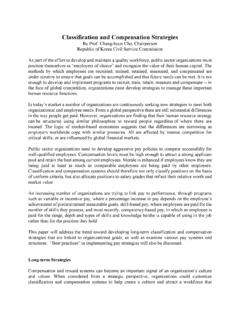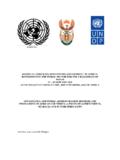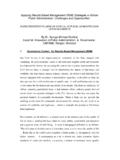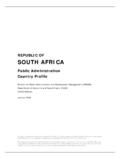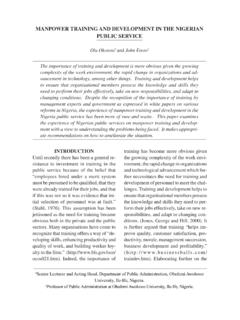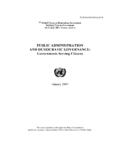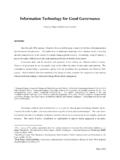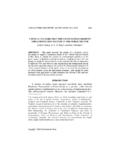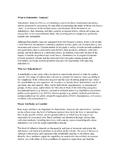Transcription of The New Public Management in Developing Countries
1 The new Public Management in Developing Countries By Charles Polidano Institute for Development Policy and Management University of Manchester Precinct Centre, Oxford Road, Manchester M13 9GH, UK. Tel: 0161 275 2819. Fax: 0161 273 8829. E-mail: IDPM Public Policy and Management Working Paper no. 13. November 1999. ABSTRACT. This paper assesses the extent to which Developing Countries have taken up new Public Management (NPM) reforms. While many Developing Countries have taken up elements of the NPM agenda, they have not adopted anything remotely near the entire package. Moreover, plenty of reform initiatives are going on that are unrelated or even contrary to that agenda.
2 New Public Management ideas are influential, but more so at the level of rhetoric than practice. In practice NPM is only one of a number of currents of reform in Developing Countries . The paper goes on to examine the argument that the new Public Management is inappropriate to Developing Countries on account of problems such as corruption and low administrative capacity. There are NPM success stories as well as failures in the Developing world. The outcome of individual NPM initiatives depends on localised contingency factors rather than any general national characteristics. Reformers need to keep an open mind as to what may work and what may not, and to be guided by the needs of the situation.
3 THE NEW Public Management IN Developing . Countries . By Charles Polidano The new Public Management has come to dominate thinking about Public sector reform by practitioners and academics alike. Some have hailed it as a new paradigm (Osborne and Gaebler 1992; Borins 1994; Hughes 1998). New Public Management reforms, it is said, are a common response to common pressures Public hostility to government, shrinking budgets, and the imperatives of globalisation. There are differing interpretations of what that common response consists of. But there is general agreement that key components include deregulation of line Management ; conversion of civil service departments into free-standing agencies or enterprises; performance-based accountability, particularly through contracts; and competitive mechanisms such as contracting-out and internal markets (Aucoin 1990.)
4 Hood 1991). Various authors also include privatisation and downsizing as part of the package (Ingraham 1996; Minogue 1998). There has been a long-drawn-out, ideologically charged debate about the merits and demerits of the new Public Management , or NPM as it is commonly known. The debate tends to focus on the desirability or otherwise of NPM reforms in principle. Advocates and critics alike often accept the assumption that the new Public Management is universal, notwithstanding that this is disputed by a growing body of THE NEW Public Management IN Developing Countries 3. The universality assumption is encouraged by the undoubted fact that NPM.
5 Catch-phrases feature prominently in the vocabulary of civil service reform all around the world (Thomas 1996). Now as always, the generals of administrative reform prefer to march into action behind a protective advance guard of rhetoric. Now as always, that rhetoric draws on whatever ideas are internationally fashionable. But has the new paradigm' gone beyond rhetoric? This paper looks at precisely this question in relation to Developing Countries . To what extent can the new Public Management genuinely be called a dominant paradigm of Public service reform in the Developing world? Researchers investigating the take-up of NPM reforms in Developing Countries , or indeed anywhere, must watch out for what we might call the seek and thou shalt find' pitfall of comparative research whereby the research question predetermines the findings.
6 We are almost bound to conclude that the new Public Management is a dominant paradigm if all we do is look for evidence of NPM-style reforms. But NPM. initiatives may be little more than a minor strand of reform, the froth at the top of the glass. Other reforms, unrelated or even contrary to the tenets of the new Public Management , may outweigh it in importance. So to be more certain of reaching a balanced conclusion, we must ask four questions in all. First, are Developing Countries committing themselves to NPM-style reforms? This question is the obvious starting-point, but it can be no more than a starting-point for the reason just outlined.
7 Second, are such reforms being undertaken as part of the worldwide quest towards greater efficiency and cost savings which is said to be the driving force of the new Public Management (see Minogue 1998), or for reasons specific to the country 4 THE NEW Public Management IN Developing Countries . concerned? This question might lead to our qualifying the universality assumption even where ostensibly NPM-style reforms are being undertaken. Third, are the reforms actually being implemented, or are we being misled by the rhetoric of political leaders (and senior bureaucrats)? As I have already mentioned, the rhetoric of reform tends to outpace the reality in any country.
8 Statements of intent can be misleading especially those pronounced at international conferences! Fourth, are reforms simultaneously being undertaken that are unrelated to the new Public Management or indeed run counter to its principles? This question helps us put any evidence of NPM-style initiatives in its proper perspective. I shall deal with each of these questions in turn. My conclusion is that while many Developing Countries have taken up elements of the NPM agenda, they have not adopted anything close to the entire package; and they are simultaneously undertaking reforms that are unrelated or even contrary to that agenda.
9 The new Public Management is only one among a number of contending strands of reform in the Developing world. The evidence gathered in this paper also sheds light on the vexed issue of the appropriateness of NPM reforms in Developing Countries . This represents a fifth question which I shall take up towards the end of the paper. Can the new Public Management work in the Developing world? Many would respond with a flat no. But this conclusion is usually reached through a priori reasoning on the basis of what are deemed to be particular characteristics of the Developing world (for example, Nunberg 1995; Schick 1998).
10 There is little examination of the outcomes of such NPM reforms as have been tried in Developing Countries . THE NEW Public Management IN Developing Countries 5. Limited though it is, the evidence on reform outcomes is much less clear-cut than might be supposed. It is hard to arrive at a blanket conclusion either for or against the transferability of NPM to Developing Countries . As we will see, localised contingency factors ones that vary from sector to sector and situation to situation within the same country play a predominant role in determining the outcome of individual reform initiatives.
